Lena Dunham wrote in one of her tweets,
Let’s be reasonable and add an eighth day to the week that is devoted exclusively to reading.
This is in fact an unvarnished desire of most of us. We all love to read books but fail to do so because of our low-grade management of time. We are living in a culture where lack of intent and poor management of time is blatantly being labeled as a shortage of time. To corroborate my argument let me state Parkinson’s law.
Parkinson’s law states that Work expands so as to fill up the time available for its completion. Knowing that we have enough time to do something often becomes the root cause of procrastination which in turn ends up eating most of our free time. Going by this law, we don’t need more time. All we need is the intent, intent to implant the habit of reading into our daily schedule.
How To Develop the Habit of Reading:-
With the right intent, even an amateur reader can comfortably read about 15 books in a year. All they would need is 30 peaceful minutes every day.
Don’t believe it?
Let’s do the simple math.
Assuming that it takes approximately 3 minutes for a novice reader to read a page.
3 minutes = 1 page
30 minutes every day= 10 pages/ day
30 minutes for 30 days = 300 pages/ month
30 minutes for 12 months = 3600 pages/ year
Further assuming that the size of an average book is about 240 pages.
So, 3600 pages/ year = 3600/240 = 15 books/year.
This simple calculation makes it very clear that even an inexperienced reader can read about 15 informative books in a year by committing a meager 30 minutes every day.
That again reinforces my point that it’s not the lack of time that’s preventing us from reading more books but the lack of the right intent.
To ease your efforts in your endeavor of becoming a voracious reader, here we have thoughtfully created this list of books to help inculcate in you this inestimably precious habit.
The Criteria Used for Selecting the Books for this List:
- Average Size
- Easy To Comprehend
- Compelling Story
- Helpful in Habit building
- Prudent Concepts on offer
Best Books To Start Reading Habit:
#1. Atomic Habits by James Clear
Favorite TakeAway ― Forget about Goals, Focus on Systems instead. Goals are about the results you want to achieve. Systems are about the processes that lead to those results.
Your Goal might be to read 24 books in a year. The system that needs to be designed for achieving this goal should involve managing time to read 20 pages a day.
The only sane way of accomplishing this goal is to read a given number of pages every day. If you take care of this system, it will take care of your goal of reading 24 books in a year.
In the words of James Clear, we don’t need to rise to the level of our goals, we need to fall to the level of our systems.
Clear has devised a practical framework that we can use in our daily lives to design good habits and eliminate the bad ones. He calls this framework the 4 laws of Behavior change.
You can use these 4 laws to inculcate the habit of reading in the following ways:-
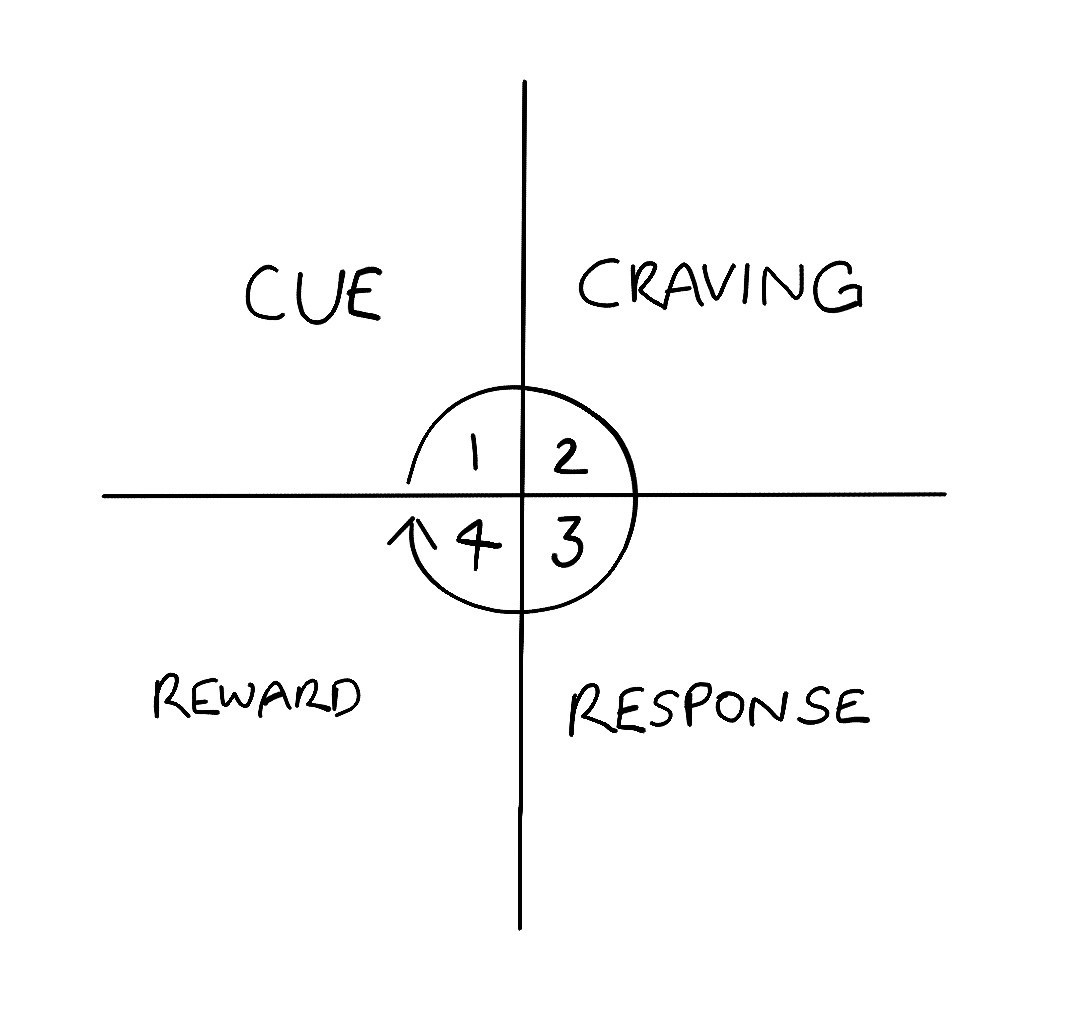
- Make it obvious (Cue) ― The books you are reading or intend to read must be in front of your eyes.
- Make it attractive (Craving) ― Start with a topic that you are very much interested in. This will ensure that you actually read the book when you see it.
- Make it easy (Response) ― Make the access to the book frictionless.
- Make it satisfying (Reward) ― The book you are picking up must have a satisfying reward on offer. Reward here can be gaining knowledge on a subject you are interested in. So that, when you actually finish the book, the newly acquired knowledge gives you a sense of satisfaction.
So, whenever you want to build a habit, simply ask yourself:
- How can I make it obvious?
- How can I make it attractive?
- How can I make it easy?
- How can I make it satisfying?
James makes it very clear that if a behavior is insufficient in any of the above four stages, it will not become a habit. A habit is a behavior that has been repeated enough times to become automatic.
I have a strong belief that this book from James Clear can definitely help you to take your habit of reading books to the point of automaticity.
Grab your copy Here ― Amazon.in | Amazon.com
#2: The 5 Am Club by Robin Sharma
Favorite TakeAway ― Take excellent care of the front end of your day, and the rest of your day will pretty much take care of itself. Own your morning. Elevate your life.
In the book, Robin Sharma talks about the 20/20/20 framework for the first hour of the day. The framework is composed of three sets of twenty minutes for the following.
- Physical exercise: This can be an intense gym session, yoga, or any other sweaty exercise.
- Reflection: This segment, as the author says is designed to reassess our natural power, dissolve our stress, and restore our inner peace.
- Learning: Read a book, listen to a podcast or read an article.
Another concept from the book that really captivated my attention is the Habit Installation Protocol. This protocol can definitely help you in building the habit of reading. According to this protocol, building a habit is a 3 stage process that involves:-
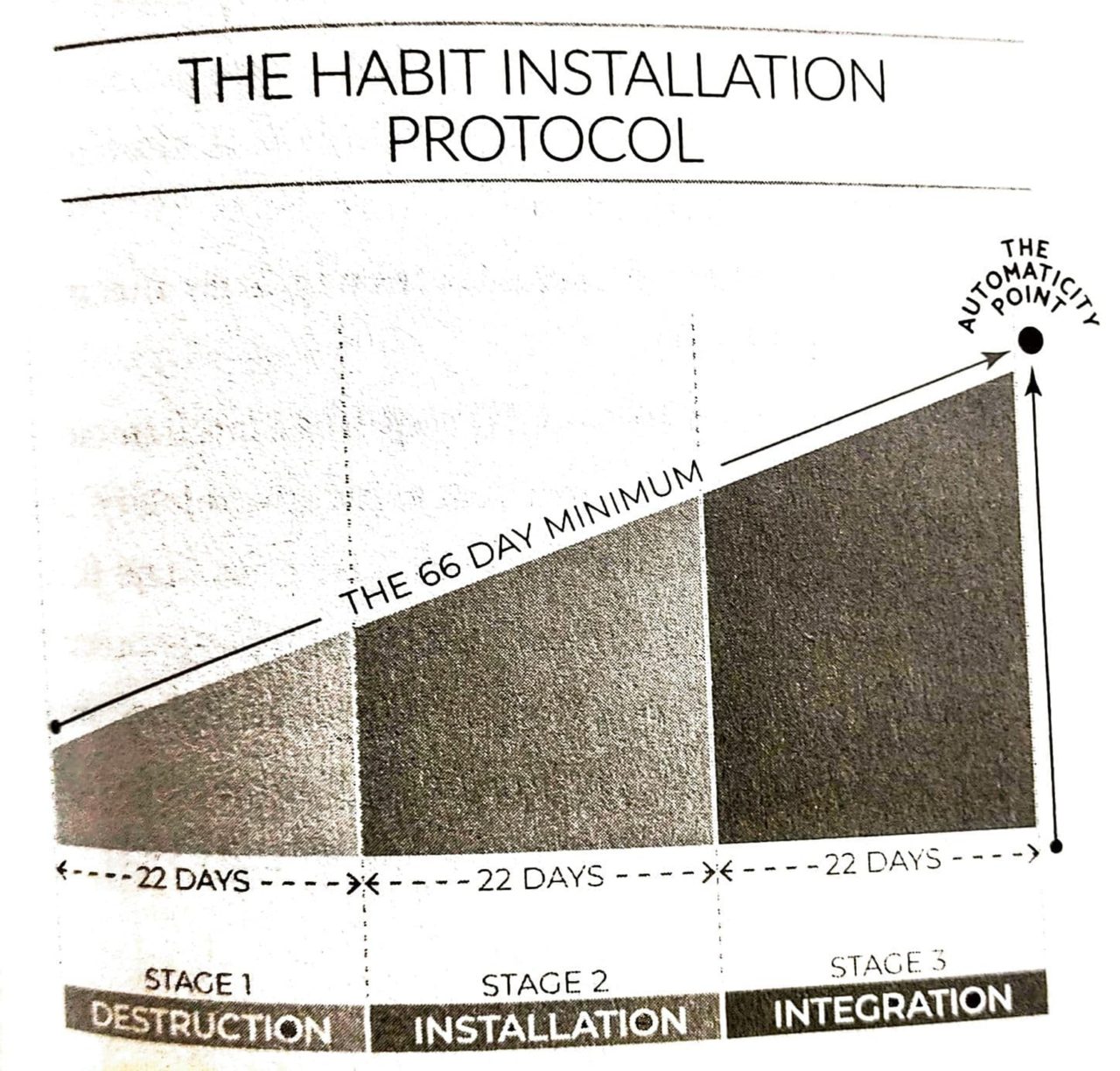
- The Destruction Stage ―This is the toughest phase during the process of building a habit. It’s tough because it involves rewriting the past patterns of our minds and destroying the old ways of operation.
- The Installation Stage ― This is the stage where new neural pathways are formed and the real installation of the new habit begins.
- The Integration Stage ― This is the third and final stage in which the habit gets integrated into your daily life.
The whole exercise takes approximately 66 days and its effectiveness is backed by research data from the University of London.
So to properly install the habit of reading books into your daily chores, all you would need is 30 minutes every day for 66 days straight.
Grab your copy Here ― Amazon.in | Amazon.com
Meanwhile, if you are into Books Get your Amazon Audible subscription and listen to Books anywhere and everywhere.
#3: The ONE Thing by Gary W. Keller and Jay Papasan
by Gary W. Keller and Jay Papasan
Favorite TakeAway ―Your next step is simple. You are the first domino.
A geometric progression is like a long, long train – it starts out too slow to notice until it’s moving too fast to stop. We take the first right step and then we take the next right step. And then we keep repeating the process. Over time the steps add up, and the geometric potential of success is unleashed.
This works because extraordinary success is sequential, not simultaneous. So getting extraordinary results is a gradual process and is all about creating a domino effect in our lives.
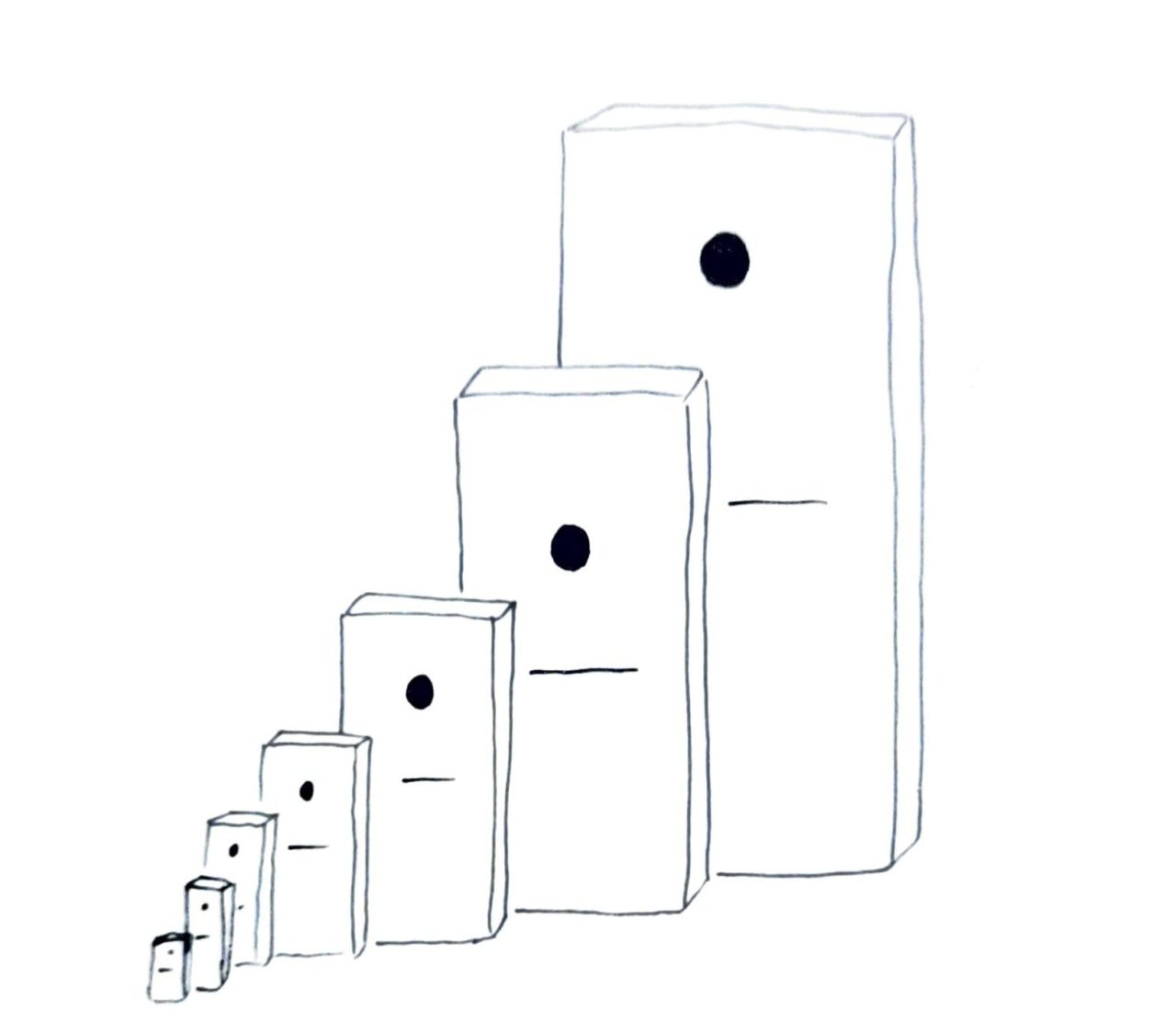
My 3 Favorite TakeAways from this book:-
- Not everything matters equally– It’s about finding that ONE thing you can do, such that by doing it everything else will become easier or unnecessary. Former Australian Prime Minister Bob Hawke once noted, “The things which are most important don’t always scream the loudest.”
To separate these low-toned yet more crucial things from the utter moonshine, we need to develop the habit of Pausing more often to decide what matters the most. Always remember, not all the causes have the same contribution to the reward. - Multitasking is a lie– Multitasking is not a way of life, it’s a way of lie. As has been proved by the results of multiple research, it’s neither efficient nor effective. In the words of Steve Uzzell, multitasking is merely the opportunity to screw up more than one thing at a time.
- Willpower is a finite resource – Will power is a finite resource and hence must be managed effectively. The author has drawn an analogy of willpower with that of the power bar of our cell phones. Every morning we start out with a full charge. As the day goes on, every time we draw on it we’re feeding on the willpower inventory. And by the end of the day, it dries up completely. The mental toll of repetitive decision-making eats upon our willpower and ends up exhausting it. Research has shown that when willpower dries up, we revert to our default settings. We all can relate to this as we all often fall prey to the lure of late-night snacking after a really tough day.
So, the TakeAway from this whole will-power story is,
Do your most important work at the beginning of the day when the willpower inventory is at its maximum capacity.
Drawing on the willpower story above, if you intend to start the habit of reading. Reading should be on top of your To-Do- List for the day.
Grab your copy Here ― Amazon.in | Amazon.com
#4: Attitude Is Everything by Jeff Keller
Favorite TakeAway ― The person with the negative attitude dwells on problems. The person with the positive attitude concentrates on solutions.
View this post on Instagram
The book Attitude Is Everything has been authored by one of the most prominent motivational speakers, Jeff Keller. As is clear from the name of the book itself, it’s about how changing our attitude can change our lives for the better. Keller reinforces in us the idea that how important it is to monitor the way we Think, Speak, and Act.
The book is very well structured and is divided into 3 parts. These 3 parts put forth the importance of the following attributes in our lives:
- Our Thoughts ― This part deals with the role of our attitude and belief in shaping our destiny. Our attitude is our window to the world. We all start our lives with a clean mental window but as we grow up, the attitude window gets clouded by rejections, disappointments, and criticisms. The biggest irony is that instead of making efforts to clean the filthy mental window (changing our attitude), we gradually get adjusted to the blurry view and end up giving up on our dreams. Thus granting the negative thoughts control over our Destiny.
- Our Words ― This part deals with how our language can help to propel us towards our goals. Our success largely depends on the diet we put our mind to. When you keep saying, you can’t code for 4 years of your undergrad, you have programmed your mind to believe that you can’t code. Keller suggests choosing words that point you in the direction of your goals. Incessant feeding of negative words will always lead to the reinforcement of negative beliefs and eventually to negative outcomes.
- Our Actions ― This is the most important part because even if we think and speak positively, we won’t achieve our dreams until we ACT. We need to act to convert our dreams into reality. Keller dares us to enter the arena and fail. He encourages us to shed our unfathomable obsession with procrastination and ACT without any further delay.
Keller’s simple language makes it a perfect read for a fresh appointee in the reading department.
Grab your copy Here ― Amazon.in | Amazon.com
Also Read: Attitude Is Everything ― Book Summary & The Powerful Lessons
#5: Rich Dad Poor Dad by Robert T. Kiyosaki
Rich Dad Poor Dad is about Robert Kiyosaki and his two dads—his real father (poor dad) and the father of his best friend (rich dad)—and the ways in which both the men shaped his thoughts about money and investing
Favorite TakeAway ― In the real world outside of academics, something more than just grades is required. I have heard it called “guts,” “chutzpah,” “balls,” “audacity,” “bravado,” “cunning,” “daring,” “tenacity” and “brilliance.” This factor, whatever it is labeled, ultimately decides
one’s future much more than school grades.
Robert Kiyosaki puts forth a very compelling point. He says that in school, we learn that mistakes are bad, and we are punished for making them. He challenges this old-school method of teaching by contouring the process by which humans learn. Humans learn by making mistakes.
We learn to walk by falling. If a child never falls down, it may never learn to walk. And, that’s one of the laws of investing too. We may lose initially but as long as the fundamentals of the company have not changed, there’s nothing for the long-term investor to worry about.
The most important takeaways from the book in terms of investing are:-
- Buy, when the Market is in Turmoil:- When a financial crisis strikes, novice investors let their emotions outperform their beliefs. They pull back from the market, selling everything they own. However, experienced investors like Kiyosaki see this as an opportunity to invest. As discussed above, as long as the fundamentals of the company have not changed, there is no justification in backing off. It’s in fact the time to accumulate more.
- Focus on the available opportunity:- According to Kiyosaki, investors should be alert to what’s happening right now, and grab any opportunity that arises. There are always some good companies available in the lousy market. Identifying these is not something that everyone can do. It’s a skill that is honed with preparation. If the investor is prepared from the knowledge perspective, he/she will never make hasty investment decisions.
One of the best ways to inveterate in you the habit of reading is to pick up the topic you are besotted with. If you are a newcomer in the reading world and are interested in getting your basic finances right, Rich Dad Poor Dad by Robert T. Kiyosaki is the best place to start.
Grab your copy Here ― Amazon.in | Amazon.com
Also, if you are into the stock market then you would love to read Best Books on STOCK MARKET & INVESTING
#6: Tuesdays with Morrie by Mitch Albom
Tuesdays with Morrie is a memoir on the 14 enlightening Tuesdays that the author, Mitch Albom spent with his terminally-ill professor, Morrie. They together called this book their “Final Thesis together”. The book is full of life-enriching lessons. It’s, in fact, a life coach in itself.
Let me share an enlightening quote from this beautiful book.
Favorite TakeAway ― The culture we have does not make people feel good about themselves. And you have to be strong enough to say if the culture doesn’t work, don’t buy it.
We all often follow certain customs and do certain things just to appease our ailing society. There is no point living that way because there are so many “doctrines of living” floating around that even if we follow one of them, we will be wrong according to another. So as Morrie says, If the culture doesn’t work, don’t buy it
If you are feeling dejected due to any reason and want to read some practically comforting words then kick-start your reading journey with this one and give Morrie a chance to transform your life for the better. After reading this, Morrie will literally become a part of your life.
Also, in terms of life lessons, this is one of the best books I have ever read.
Also Read: 9 Powerful Life Lessons From Mitch Albom’s Tuesdays with Morrie
Grab your copy Here ― Amazon.in | Amazon.com
Meanwhile, if you are into Books Get your Amazon Audible subscription and listen to Books anywhere and everywhere.
#7: The Alchemist by Paulo Coelho
by Paulo Coelho
The Alchemist is a novel by Brazilian author Paulo Coelho. It describes the journey of a shepherd boy named Santiago. It is a narrative of how he follows his dream and unfolds the treasure.
The theme of the book is:
When you want something, all the universe conspires in helping you to achieve it.
If you are a complete beginner at reading, then this is the best place to start. The simple language and compelling story make it a perfect read for anyone struggling to inculcate the habit of reading.
My favorite takeaway from this is that growth is contagious as it creates a ripple effect. When we strive to become a better version of ourselves, everything around us becomes better, too.
Drawing an inference from this, we can say, to become a better reader, we might consider surrounding ourselves with people who read a lot.
 Ripple Effect
Ripple Effect
This one from Coelho has so much to offer that I have made it a custom to read this one at least once every year because it keeps reminding me that no one has exclusive rights to greatness and anyone can be great.
Grab your copy Here ― Amazon.in | Amazon.com
Also Read: The Fault in The Crystal Merchant’s Line of Reasoning in The Alchemist
#8: The Last Lecture by Randy Pausch
Favorite TakeAway ― Time is all you have and you may find one day that you have less than you think.
After being diagnosed with Pancreatic Cancer, more than anything else, Randy was terrified at the fact that his three small children would only have vivid memories of their father when they are grown-ups.
So, when invited for The last lecture, Randy wanted to convert his last chance into something meaningful that could continue to serve as a good reference for his children growing up in his absence.
So, he gave the Lecture, “Really Achieving Your Childhood Dreams.” His feelings could be understood from the following words,
I was trying to put myself in a bottle that would one day wash up on the beach for my children. If I were a painter, I would have painted for them. But I am a lecturer, so I lectured.
Soon after the lecture concluded, Randy became an overnight star. His nerdy persona appealed to the masses and his lecture went viral on YouTube.
Though Randy lost his battle with cancer, his “lessons on living” won the internet and continue to be the guiding light for thousands like me.
If you have a dream and are interested in real-life heroes, then this book can be a perfect start to help you materialize your desire of becoming an avid reader.
Grab your copy Here ― Amazon.in | Amazon.com
Also Read: The Last Lecture – 9 Powerful Lessons From A Dying Professor
Also, if you are into Books Get your Amazon Audible subscription and listen to Books anywhere and everywhere.
The Best Books:
Recommended Reading Lists
1. Best Books That Teach the Art of Living a HAPPIER LIFE
2. Best Books on STOCK MARKET & INVESTING
3. Best Books To Help You Find HOPE During Your Darkest of Times
4. Best Books on Learning & Mastering SONGWRITING
5. Must-Read Books on Punjab’s History and Culture
6. Best Books That Talk about Sologamy
8. 7 Alan Watts Books That Talk About Human Existence
That’s all we have for today. Thanks a lot for tuning in to HappinessDhaba. Do let us know your views on this in the comment section.
Signing off with our favorite words
Zindagi Zindabad!
Author Profile

Recent Posts
 The Punjabi LiteratureJuly 14, 2025Paash on the Death of Dreams ― Sab Ton Khatarnak
The Punjabi LiteratureJuly 14, 2025Paash on the Death of Dreams ― Sab Ton Khatarnak Blog PostsApril 6, 2025Rebuilding Identity After The Self Falls Apart | by Jasmeet
Blog PostsApril 6, 2025Rebuilding Identity After The Self Falls Apart | by Jasmeet Book Summaries & LessonsFebruary 6, 2025BURN IT ALL: Kafka’s Legacy and the Friendship That Saved It
Book Summaries & LessonsFebruary 6, 2025BURN IT ALL: Kafka’s Legacy and the Friendship That Saved It Life Through SongsJanuary 20, 20259 Best Punjabi Heer Ranjha Songs ― The Modern Playlist
Life Through SongsJanuary 20, 20259 Best Punjabi Heer Ranjha Songs ― The Modern Playlist
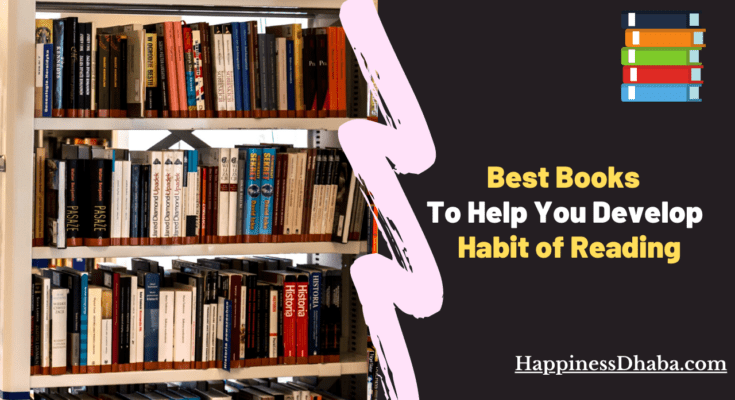


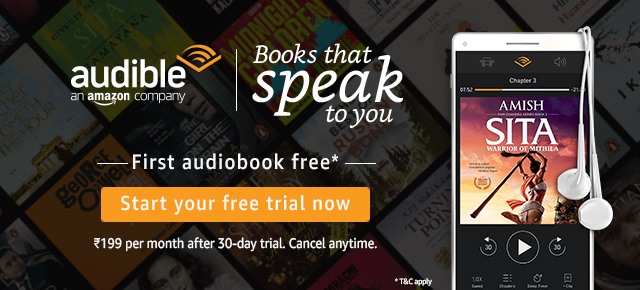





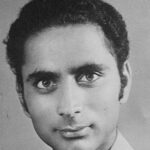






This is a must read list for everyone. I have read James clear’s Atomic Habit and yes it can really be helpful for anyone interested in starting reading. But it’s only for people above a certain age. Btw, thanks for this list. Loved reading it.
Glad you liked it!